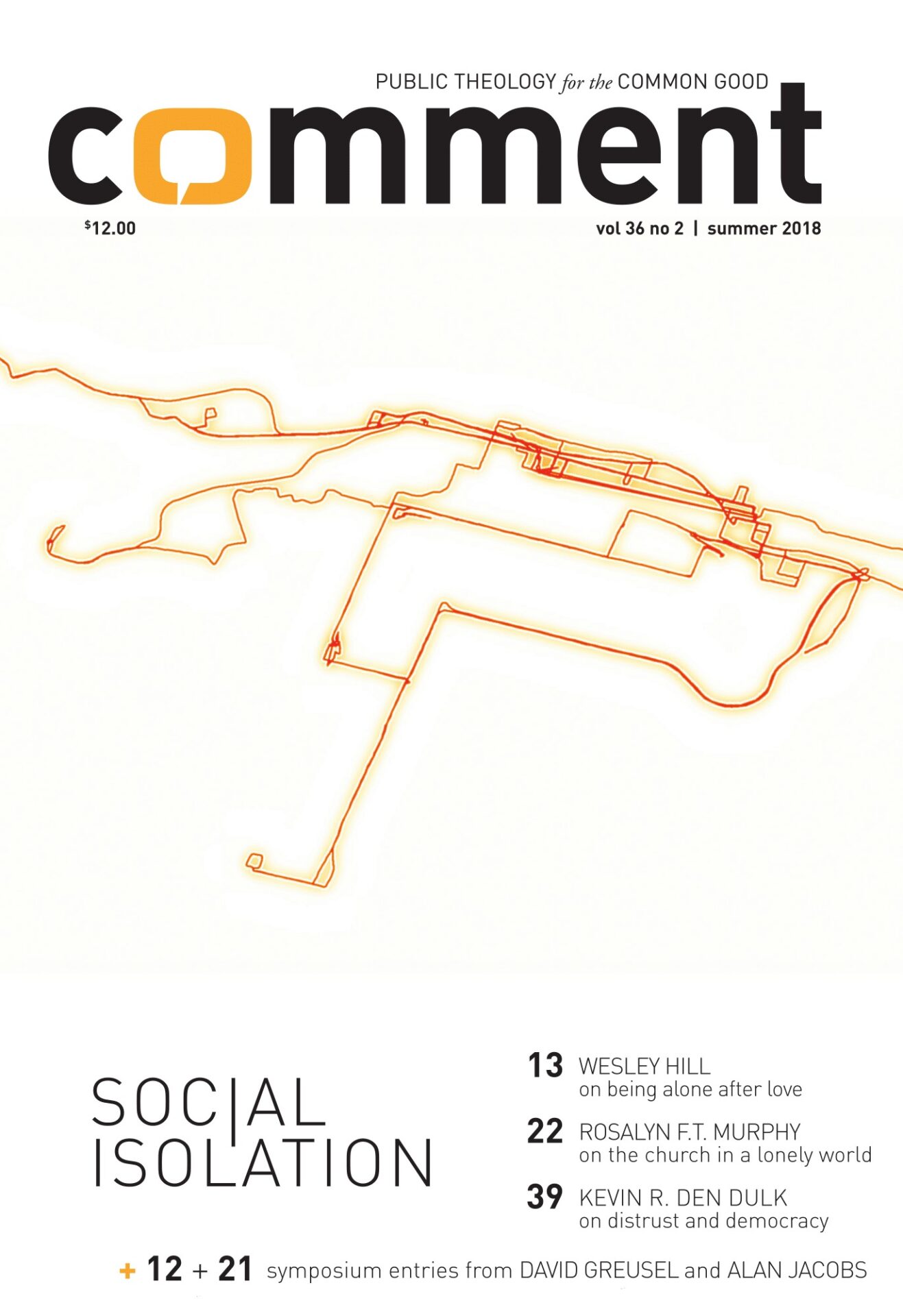Loneliness is on the rise. Suicide is one of the leading causes of death among young people. Our social media networks may number in the hundreds, even thousands, but it appears that our actual social network is fraying. This social isolation was the main topic of the latest issue of Comment magazine, which explored the way that our families, friendships, churches, and cities all show increasing signs of this social isolation. While offering some diagnoses of what’s wrong and some signposts of hope, this collection of articles raises a deep question: what’s at the root of this social isolation? As we look at the symptoms, is there an underlying cause of this variegated and vicious disease?
Patrick Deneen’s Why Liberalism Failed provides an instructive and incisive answer. Deneen asserts that much of what we currently lament—economic inequality, a desiccated education, a cynical and disengaged citizenry, an ever-expanding state and increasingly isolated individuals—are not so much unfortunate accidents of liberalism, but part of the inner logic of liberalism itself (by “liberalism,” Deneen means the fundamental vision of liberty as autonomous choice, a view shared by both those labeled conservatives and liberals in popular discourse). Deneen’s basic thesis is that liberalism has failed precisely because it succeeded. That is, what we’ve tended to label as bugs are actually key features of the operating system.
What if social isolation is simply the natural fruit of individualistic liberalism?
Combining Deneen’s thesis with the work of the authors in Comment leads me to ask: what if social isolation is simply the natural fruit of individualistic liberalism? What if it’s not the result of something gone awry in American culture, but the outworking of our deepest held beliefs and practices? Put in other words, if the primary way we conceive of the human being is as a rights-bearing, autonomous “individual”—without place, ethnicity, culture, family, custom, or religion—then the social isolation we’re presently experiencing should actually be seen not as an aberration of liberalism’s anthropology, but as its apex.
Deneen rightly recognizes that if social isolation is to be overcome, an alternative anthropology must be offered. Sartre’s dictum “hell is other people” helpfully summarizes the ideal of an autonomous, self-creating self. This hell is vividly depicted by C. S. Lewis in The Great Divorce, in which Lewis’s hell looks a lot like sprawling suburbia, where people are constantly moving further and further away from one another in order to achieve their vision of the good life, which doesn’t include other people. This is a vision of a world where rights are maximized and liberty entails freedom to do whatever I want, with no thought of responsibility, obligation, or affection. The downside is that, as Wendell Berry puts it, when we are set free from responsibility, we are also set free “from the possibility of meaning.” Even Sartre understood that, with only self-generated meaning, we will be led to face despair and forlornness.
So what should we do? What can we do? For starters, social isolation cannot be treated symptomatically. Unless we are willing to consider an alternative anthropology, one that underscores that we are inherently social and relational—a political animal from the very start—we will continue to see the tragedy that results when people, perhaps rightly, fail to see any meaning in the ideal of absolute autonomy. As Berry points out, human beings, as living organisms, are always dependent, porous and placed in relation to one another, to future and past generations, and to the land; it is only corpses who are “independent” from the surrounding environment in the sense that they have no needs or dependency, precisely because they are dead. Thus, Berry’s anthropology, like that of Lewis, is rooted in a vision of the common good that begins from a place of fundamental connection, caretaking, and responsibility, rather than isolation.
The way forward, then, is an alternative vision of liberty that is as old as Genesis, a vision that calls us to see that accepting our limits and creatureliness is the true path to freedom. To see this vision of connection requires faith and imagination, not because it’s so unbelievable, but because it seems too good to be true. Rather than being rooted in suspicion and fear, it looks to the birds of the air and the lilies of the field, which never give a second thought to being anything other than connected creatures, and thereby are free.






11 comments
Zachary Blanchard
Branson,
I love the Berry/Sartre line “The downside is that, as Wendell Berry puts it, when we are set free from responsibility, we are also set free “from the possibility of meaning.” Even Sartre understood that, with only self-generated meaning, we will be led to face despair and forlornness.” Can you cite both sources – I’d like to check them out.
Concerning the general direction of the article, I do wonder what it looks like to play out your “alternative vision of liberty” in a world that is economically specialized, religiously diverse, and urban? These are all facts of contemporary American (and largely what we mean by “Western”) life. They aren’t going away, and I think a Localism that doesn’t accept them, and desires a return-to-Port-William, will always be in the realm of wishful thinking, rather than feasible action.
Branson Parler
Zachary,
Thanks for asking. The Berry quote is from “Rugged Individualism,” in The Way of Ignorance book, p. 10. The Sartre discussion is from a 1947 book titled “Existentialism,” translated by Bernard Frechtman in 1947. The portion I was looking at on despair and forlornness is excerpted in a philosophy textbook, “Philosophy: The Quest for Truth,” Oxford University Press, 7th edition, pp. 516-521 (edited by Louis Pojman and Lewis Vaughan).
I agree (and I think Berry would too) that the question is not how to go back to a nostalgic past but how to show fidelity to the people and places we’re connected to currently. I think it’s probably always going to be smaller and more basic than we might imagine. One example I can think of in my own neighborhood is the urban farm that was started on our church’s property, making that space into something that is common ground for a diverse group of people. Both for those who work there and those who get their food there, it’s a small step but one in the right direction.
Dan Weaver
Is it correct to assume the way characters in a novel are portrayed means that is what the author thinks about all people of that gender, race or whatever other groups the character belongs to? If I write a novel about a white rapist, does that mean I think all white men are rapists? I think we need to be careful about using a novel’s characters or dialogue as being indicative of the author’s views.
Colin
There was a speech Berry gave (For the life of me, I can’t remember where), and he discussed the negative reaction to his comments on homosexuality. While I don’t remember his exact comments, I recall him stating that his view was that the Government should not, or maybe, does not have the aithority to dictate the union of two people. Again, I am not entirely sure of his statement, but I share in this sentiment.
At the time I became aware of this “controversy” regarding Wendall Berry’s point of view, the Supreme Court made one, if not definitively there, quickest decision with sweeping social change in U.S. history. With the battle won, the glass ceiling smashed, anf the view lifted (insert your adage here), I found it somewhat ironic the lashing out on this issue persisted.
This type of behavior on Anti-Social media continues to permeate daily lide for most people. How strange that the child of its bedfellow, Liberalism, can at times reflect rampant social isolation. I think Mr. Parler illustrates this much better than I am able.
Also, thank you for the use of “het-up” Rob. That is going to be my word-a-day.
Rob G
Karen is wrong about Berry. (And if this is the “Karen” that I think it is, a rather breathless, het-up hyper-feminist who’s shown up here before, she’s wrong about a lot of things.)
I’ve read all of Berry’s fiction, some of it more than once, and at least half of his nonfiction. Nowhere does he take the view that she attributes to him.
Karen
What about the figure of Clydie in ‘Jayber Crow?’ She is painted as a filthy whore whom the title character properly dumps so that he can maintain his fantasy fidelity to the doormat Earth-mother Mattie. (And if I remember correctly, Mattie’s father leaves the farm to Mattie’s worthless husband instead of his own daughter, and Berry never indicates that this was not the correct decision? How is that anything but saying that worthless men are better than any and all women?)
Colin Gillette
I am not challenging you here Karen; I am genuinely interested to know where Wendall Berry is cited as having this view on women. Again, I have never seen it, and would like to know if in my reading of Wendall I unintentionally rooted myself into a misogynistic view of the world. The thought of mistreating women disparages my innate sensibilities.
I do know that he is cited as writing, “Women have complained, justly, about the behavior of “macho” men. But despite their he-man pretensions and their captivation by masculine heroes of sports, war, and the Old West, most men are now entirely accustomed to obeying and currying the favor of their bosses. Because of this, of course, they hate their jobs—they mutter, “Thank God it’s Friday” and “Pretty good for Monday”—but they do as they are told. They are more compliant than most housewives have been. Their characters combine feudal submissiveness with modern helplessness. . . . These men, moreover, are helpless to do anything for themselves or anyone else without money, and so for money they do whatever they are told.” I think this statement asks why women would ever want an equal misery to the plight of a compliant and subservient existence.
It sounds more like “Ars Poetica,” where MacLeish writes:
“A poem should be equal to:
Not true.
For all the history of grief
An empty doorway and a maple leaf.”
The energy invested in comparing one’s self to another, be it male, female, black, white, or purple with green polka-dots, does indeed, sound exhausting. What does ruling in hell alone mean in that empty doorway? A history of grief seems so long. I don’t want to be equal to the prison of a meaningless life. I certainly don’t wish that on you.
Karen
Berry has exactly zero educated female characters in his novels that he presents in a positive light. For him, the highest and best position a woman can have is to be the (downtrodden, ignorant, and economically helpless) wife of a farmer. No dreams, no achievements, barely even literate — her job is to breed babies and keep her mouth shut, rather like he treats his own wife. (If his wife is not his punching bag, Berry should have had her respond to the critics of his Harper’s essay. That he did not indicates to me that he does not allow her to speak.)
Can you make a case that your system will allow women to have our own money and autonomy? Will we receive educations or will we be taught the most rudimentary literacy and then forced to cook and clean forever? Being alone with cats is a far better life than being the stupid domestic drudge for some man.
Karen
What happens to those of us born to the bottom rungs of this network: the women, dark-skinned people, the poor, the disabled, those who are not straight, white, wealthy, heterosexual males who belong to the dominant religion? Berry’s view of what women ought to forced to do — stay home, cook, clean, type his manuscripts on a manual typewriter and never get a penny in royalties from all that shit work — does not inspire me to adopt your view. Individualism has flaws, but for those of us who are not at the top of the social heap, it works much better than your alternative. I do think it’s better to rule in Hell than serve in your heaven.
Zachary Blanchard
Karen,
The concern from a feminist perspective is certainly fair, though I think it’s certainly fair to say that if Berry desires to ‘constrain’ women by making them all the wives of farmers, he ‘constrains’ men by wanting to make them all farmers. You can agree or disagree with the idea that some natural idea dictates some sort of gender-specific desirable behavior, but I don’t think it’s accurate to call Berry a hypocrite. It’s like in Muslim culture: I definitely saw examples in London where women were governed by very strict social norms, and men basically had no analogous restrictions. But in a culture like Oman, where piety is fairly ubiquitous and social restrictions are equally applied to both women and men, even if they are different in form based on gender, I think the restrictions are both completely fair and beautiful in a humility-is-beautiful sort of way.
Also, an article on Tanya Berry, Wendell Berry’s wife, from the sustainability blog Resilience: https://www.resilience.org/stories/2017-12-14/the-woman-beside-wendell-berry-the-most-important-fiction-editor-almost-no-one-has-heard-of/
Robert
Blah, blah, blah.
Blah,blah, blah, blah.
Blah.
Comments are closed.